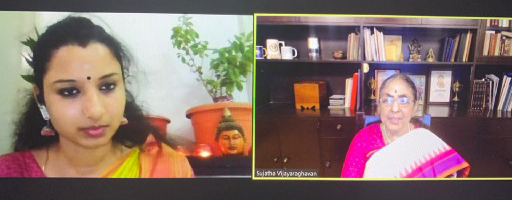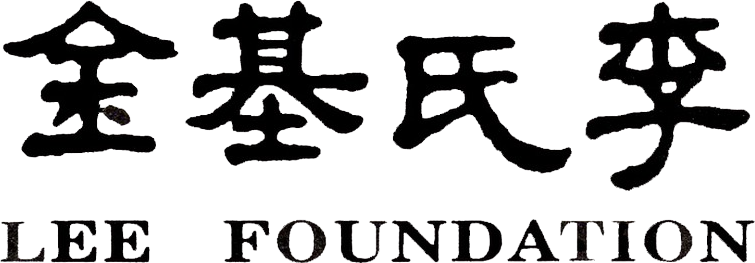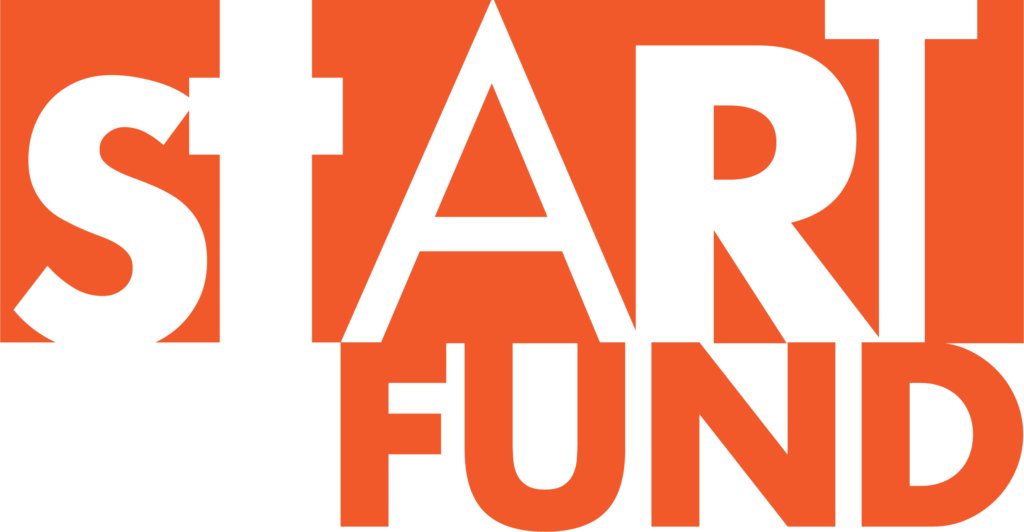
In yet another curation masterstroke by Aravinth Kumaraswamy, Gyandev Singh’s session on lighting was befittingly followed by a session on the importance of appreciation of music and poetry for dance by the versatile and knowledgeable Sujatha Vijayaraghavan. In a beautiful hour-long lec-dem, Sujatha Vijayaraghavan shed light on how the dance blossoms when the dancer digs deep into the poetry and the music of the dance and also offered interesting insights on how to do it, breaking it into simple, practical ways that could help enhance a dancer’s relationship with both these aspects.
This session was hosted by Kritika Rajagopalan of Apsaras Arts.
“You see, dance is often described as drishya kavyam, which means visual poetry and not visual drama mind you,” she said, “It’s the poetic quality of this form of dance that appeals to the rasika through the subtleties and evocative nature that it creates through the abhinaya.”
How does one therefore set off their own understanding of poetry? How does one begin to appreciate and engage with poetry? Should one only be reading poetry that pertains to dance? “Not at all,” Sujatha said, “In fact you should read any poem; if you are familiar with a vernacular language, preferably your mother tongue, then that would be the best. This is because every language brings with it its own tradition, culture, thoughts, context, et al.”
An important tip she shared was to always when starting to engage with a poem to interpret in dance is to find its most authentic source. “Don’t look at the internet,” she said, “Look for the right source and once you do that, attempt to find its contextual meaning. Read around the word looking to see what context it attempts to emphasise; try to get to what the poet is actually trying to convey.”
Once you establish context and comfort, she suggested you move towards contemplation. “Read not the word,” she said, “introspect and ruminate over the poem, the words, let it marinate within and create some vibes and then after a while go back and read it again,”
Sujatha Vijayaraghavan also referred to finding the poetic core and talked of the legendary Subramanya Bharathi’s compositions — a poem titled Agni Kunjondru Kanden and talked of how it allows the dancer to find in it interpretation possibilities, aplenty. She also talked of a verse from the Thurukkural and alluded to the importance of finding in those two words, the core essence of what is being said.
“We know the core as finding the sthayi brava but sometimes it goes a little beyond that,” she said, “Sometimes the core may be in a single word. Like a pada varnam by maestro, Lalgudi G Jayaraman — Innam en manam ariyAdavar pOla irundiDal nyAyamA yAdava mAdhavA. The core word here, is Pola (meaning something like in Tamil), which actually reflects the state of mind of the woman who is entreating Krishna. Once you figure out the core word, your body language is dictated by this awareness. In this case, you recognise she is very much in love with him; all she wants from him is comfort and reassurance.”
Speaking of music, Sujatha Vijayaraghavan spoke about understanding the ragam, layam and the sahityam. Carnatic music, she said, is ragam-based music and to appreciate it you have to listen to it, and a lot. “You have to make it a preoccupation,” she said, “Ragams are like colours; they create emotions and are evocative.”

Speaking of layam, she talked of Jathiswaramn and Thillana that is an interplay of swaras but lending with its variations in layam, possibilities aplenty in terms of dance. The most powerful was the concluding piece Sujatha presented. A Pudu Kavidai by Vairmathu that was performed by them way back in 1992. “Woven around the concept of trees, this poem has no metre so it’s a challenge to set it to music and yet it has a flow. The final lines in the poem talk of how every tree is a Bodhi tree, a tree of enlightenment.”
Perhaps, the hidden meaning is that there’s something to learn from everyone and seeking and learning are the best ways to enlighten ourselves!
Up next
on September 12, Lalgudi Thillanas by Lalgudi GJR Krishnan and Lalgudi Vijayalakshmi 4.30 to 5.30pm (IST)









